小学英语比较级和最高级
小学英语比较级最高级全
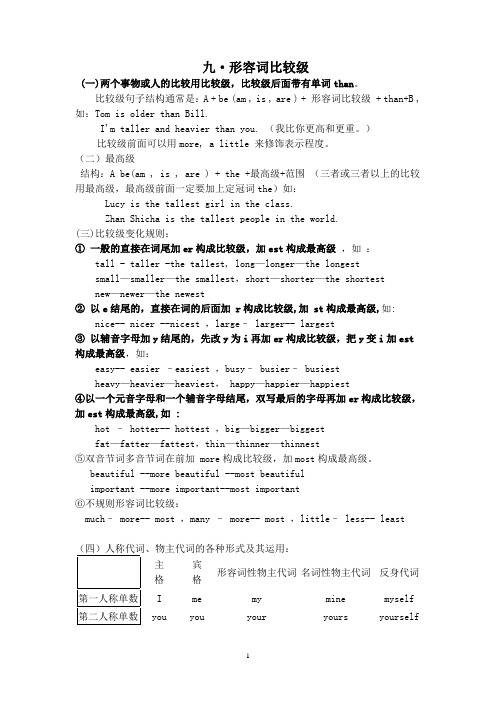
九·形容词比较级(一)两个事物或人的比较用比较级,比较级后面带有单词than。
比较级句子结构通常是:A + be (am , is , are ) + 形容词比较级 + than+B ,如:Tom is older than Bill.I'm taller and heavier than you. (我比你更高和更重。
)比较级前面可以用more, a little 来修饰表示程度。
(二)最高级结构:A be(am , is , are ) + the +最高级+范围(三者或三者以上的比较用最高级,最高级前面一定要加上定冠词the)如:Lucy is the tallest girl in the class.Zhan Shicha is the tallest people in the world.(三)比较级变化规则:①一般的直接在词尾加er构成比较级,加est构成最高级,如:tall - taller -the tallest, long—longer—the longestsmall—smaller—the smallest,short—shorter—the shortestnew—newer—the newest②以e结尾的,直接在词的后面加 r构成比较级,加 st构成最高级,如:nice-- nicer --nicest ,large– larger-- largest③以辅音字母加y结尾的,先改y为i再加er构成比较级,把y变i加est 构成最高级,如:easy-- easier –easiest ,busy– busier– busiestheavy—heavier—heaviest, happy—happier—happiest④以一个元音字母和一个辅音字母结尾,双写最后的字母再加er构成比较级,加est构成最高级,如 :hot – hotter-- hottest ,big—bigger—biggestfat—fatter—fattest,thin—thinner—thinnest⑤双音节词多音节词在前加 more构成比较级,加most构成最高级。
完整小学英语比较级和最高级
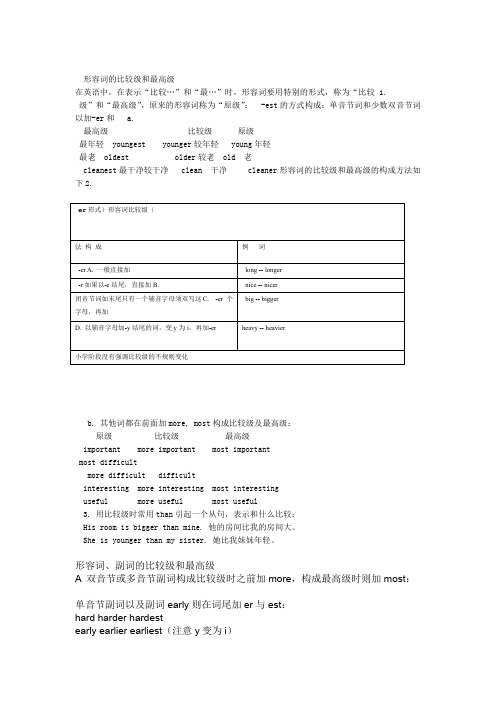
形容词的比较级和最高级在英语中,在表示“比较…”和“最…”时,形容词要用特别的形式,称为“比较 1.级”和“最高级”,原来的形容词称为“原级”: -est的方式构成:单音节词和少数双音节词以加-er和 a.最高级比较级原级最年轻 youngest younger较年轻 young年轻最老 oldest older较老 old 老cleanest最干净较干净 clean 干净 cleaner形容词的比较级和最高级的构成方法如下2.b. 其他词都在前面加more, most构成比较级及最高级:原级比较级最高级important more important most importantmost difficultmore difficult difficultinteresting more interesting most interestinguseful more useful most useful3. 用比较级时常用than引起一个从句,表示和什么比较:His room is bigger than mine. 他的房间比我的房间大。
She is younger than my sister. 她比我妹妹年轻。
形容词、副词的比较级和最高级A 双音节或多音节副词构成比较级时之前加more,构成最高级时则加most:单音节副词以及副词early则在词尾加er与est:hard harder hardestearly earlier earliest(注意y变为i)B 不规则变化:well better bestbadly worse worstlittle less leastmuch more mostfar farther farthest(仅用于指距离)further furthest.much,more,mostA more和most的用法相当自由:You should ride more.你必须多骑马。
小学英语比较级

一、形容词、副词的比较级和最高级的构成规则1.大多数单词的变法small→smaller→smallest short→shorter→shortest great→greater→greatest clever→cleverer→cleverest narrow→narrower→narrowest tall→taller→tall est2.以不发音e结尾的单音节词,比较在原级后加-r,最高级在原级后加-st;large→larger→largest nice→nicer→nicest3.先双写末尾的辅音字母,比较级加-er,最高级加-est;big→bigger→biggest hot→hotter→hottest fat→fatter→fattest thin-thinner-thinnest new--newer/newest sad-sadder--saddest red--redder--reddest4.以“辅音字母+y”结尾的双音节词,把y改为i,比较级加-er,最高级加-est;easy→easier→easiest heavy→heavier→heavies t busy→busier→busiest happy→happier→happiest5.其他双音节词和多音节词,比较级在前面加more,最高级在前面加most;beautiful→more beautiful→most beautifuldifferent→more different→most different注意:(1)形容词最高级前通常必须用定冠词the,副词最高级前可不用。
6.有少数形容词、副词的比较级和最高级是不规则的,必须熟记。
good-----better------best 好的well------better------best 身体好的bad------worse------worst 坏的ill--------worse-------worst 病的many--------more------most 许多much------more--------most 许多few------less-------least 少数几个little-------less------least 少数一点儿far------further------furthest 更进一步,程度far------farther------farthest 更远,路程old-------older------oldest 年老的(指年纪)old------elder-------eldest 年老的(指兄弟姐妹的排行)二、形容词、副词的比较级和最高级的用法1.“A + be +形容词比较级+ than + B” 意思为“A比B更……”。
比较级最高级变化规则总结

比较级最高级变化规则总结在英语学习中,比较级和最高级是非常重要的语法知识点。
它们用于描述事物之间的程度差异,帮助我们更准确、生动地表达想法。
下面就来详细总结一下比较级和最高级的变化规则。
一、形容词和副词比较级和最高级的构成规则1、一般情况单音节词和少数双音节词,直接在词尾加 er 构成比较级,加 est 构成最高级。
例如:tall(高的) taller tallest例如:short(矮的) shorter shortest例如:fast(快的) faster fastest以不发音的 e 结尾的单音节词,直接在词尾加 r 构成比较级,加 st 构成最高级。
例如:nice(好的) nicer nicest例如:large(大的) larger largest以重读闭音节结尾,且末尾只有一个辅音字母的词,要先双写这个辅音字母,再加 er 构成比较级,加 est 构成最高级。
例如:big(大的) bigger biggest例如:hot(热的) hotter hottest例如:thin(瘦的) thinner thinnest2、多音节词和部分双音节词在词前加 more 构成比较级,加 most 构成最高级。
例如:beautiful(美丽的) more beautiful most beautiful例如:important(重要的) more important most important例如:difficult(困难的) more difficult most difficult3、不规则变化有些形容词和副词的比较级和最高级变化是不规则的,需要特别记忆。
例如:good(好的) better best例如:bad(坏的) worse worst例如:many / much(许多) more most例如:little(少的) less least例如:far(远的) farther / further farthest / furthest二、比较级和最高级的用法1、比较级的用法表示两者之间的比较,常用“than”连接。
小学英语09-副词比较级-最高级及用法

什么是副词?副词是一种修饰动词、形容词或全句的词,说明时间、地点、程度、方式等概念。
一、副词的分类1.时间副词now, today, yesterday, tomorrow, before, soon, early等,其出现往往决定了该语句表达的时态。
Now I'm writing a letter.现在我正在写信。
I went to the park yesterday.我昨天去公园了。
I will be back soon.我很快就回来了。
2.频率副词部分频率副词频率高低的排序:always (—直)♥♥♥♥♥♥♥♥♥♥usually (通常)♥♥♥♥♥♥♥often (经常)♥♥♥♥♥♥sometimes (有时)♥♥♥♥♥seldom (很少)♥♥♥♥hardly (几乎不)♥♥♥never (从不)还有说明次数的副词,once, twice等。
频率副词经常出现在一般现在时态的语句中,表示规律性的动作或习惯。
Ben often goes to the cinema with his friend.本经常和他的朋友岀去看电影。
He never eats hamburgers.他从不吃汉堡包。
3.地点副词here, everywhere, anywhere, in, out, inside, outside, above, below, down,back, forward, home, along, round, around, near, off, past, up, away 等地点副词一般表示事情发生的地点。
He played basketball here yesterday他昨天在这里打篮球。
It's raining outside.外面正在下雨。
The toilet is over there.厕所在那里。
4.方式副词carefully, properly, anxiously, suddenly, normally, fast,well, calmly, politely, proudly, softly, warmly等一般表示事情进行的方式。
29、小学英语语法比较级 & 最高级
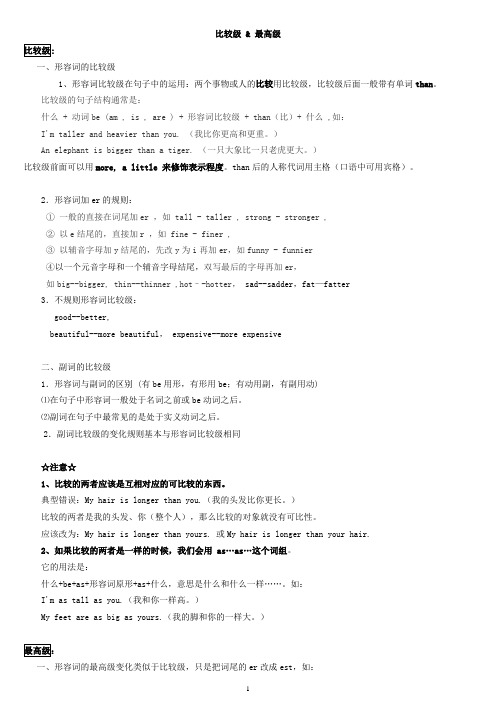
比较级 & 最高级一、形容词的比较级1、形容词比较级在句子中的运用:两个事物或人的比较用比较级,比较级后面一般带有单词than。
比较级的句子结构通常是:什么 + 动词be (am , is , are ) + 形容词比较级 + than(比)+ 什么 ,如:I'm taller and heavier than you. (我比你更高和更重。
)An elephant is bigger than a tiger. (一只大象比一只老虎更大。
)比较级前面可以用more, a little 来修饰表示程度。
than后的人称代词用主格(口语中可用宾格)。
2.形容词加er的规则:① 一般的直接在词尾加er ,如 tall - taller , strong - stronger ,② 以e结尾的,直接加r ,如 fine - finer ,③ 以辅音字母加y结尾的,先改y为i再加er,如funny - funnier④以一个元音字母和一个辅音字母结尾,双写最后的字母再加er,如big--bigger, thin--thinner ,hot–-hotter, sad--sadder,fat—fatter3.不规则形容词比较级:good--better,beautiful--more beautiful, expensive--more expensive二、副词的比较级1.形容词与副词的区别 (有be用形,有形用be;有动用副,有副用动)⑴在句子中形容词一般处于名词之前或be动词之后。
⑵副词在句子中最常见的是处于实义动词之后。
2.副词比较级的变化规则基本与形容词比较级相同☆注意☆1、比较的两者应该是互相对应的可比较的东西。
典型错误:My hair is longer than you.(我的头发比你更长。
)比较的两者是我的头发、你(整个人),那么比较的对象就没有可比性。
应该改为:My hair is longer than yours. 或My hair is longer than your hair.2、如果比较的两者是一样的时候,我们会用as…as…这个词组。
小学英语语法(不规则动词及比较级_最高级的不规则变化)

一、比较级不规则变化1、不规则变化good/well——better——bestbad/badly/ill——worse——worstmany/much——more———mostold——older/elder——oldest/eldestlate——later/latter——latest/lastlittle——less——leastfar——farther/further——farthest/furthest2、单音节不规则变化tired——more tired——most tiredfond——more fond——most fondglad——more glad——most gladbored——more bored——most boredpleased——more pleased——most pleased3、两种变化cruel——crueler——cruelest/more cruel——most cruelstrict——stricter——strictest/more strict——most strictoften——oftener——oftenest/more often——most oftenfriendly——friendlier——friendliest/more friendly——most friendly clever——cleverer——cleverest/more clever——most clever4、没有比较级empty wrong perfect unique extreme excellent favourite favorite true right correct extremely二、过去式不规则变化1、A A A型(动词原形、过去式、过去分词同形)cost(花费)——cost——costcut(割)——cut——cuthit(打)——hit——hithurt (伤害)——hurt——hurtlet(让)——let——letput(放)——put——putread (读)——read——readset(安置)——set——setshut(关闭)——shut——shutbroadcast(广播)——broadcast——broadcastburst(爆发)——burst——burstsplit(切开)——split——split2、AAB型(动词原形与过去式同形)beat(跳动)——beat——beaten3、ABA型(动词原形与过去分词同形)become(变成)——became——becomecome(来)——came——comerun(跑)——ran——run overcome——overcame——overcome4、 ABB型(过去式与过去分词同形)bend(使弯曲)——bentdig(挖)——dug——dugget(得到)——got——gothang(吊死)—— hanged——hangedhang(悬挂)——hung——hunghold(抓住)——held——heldshine(照耀)——shone——shonesit(坐)——sat——satwin(赢)——won——wonmeet(遇见)——met——met keep(保持)——kept——keptsleep(睡)——slept——slept sweep(扫)——swept——sweptfeel(感觉)——felt——felt smell(闻)——smelt——smeltleave(离开)——left——left build(建设)——built——builtlend(借出)——lent——lent send (传送)——sent——sentspend(花费)——spent——spentlose(丢失)——lost——lostburn (燃烧)——burnt——burntlearn(学习)——learnt ——learntmean(意思是)——meant——meantcatch(抓住)——caught——caughtteach(教)——taught——taughtbring(带来)——broughtbroughtfight (战斗)——fought——foughtbuy(买)——bought——boughtthink(想)——thought——thoughthear (听见)——heard——heardsell(卖)——sold——soldtell(告诉)——told——toldsay(说)——said——saidfind(找到)——found——foundhave/has(有)——had——hadmake(制造)——made——madestand(站)——stood——stood understand(明白)——understood——understood5、ABC型(动词原形、过去式与过去分词三者不同形)begin(开始)——began——begundrink(喝)——drank——drunkring(铃响)——rang——rungsing (唱) sang sungswim(游泳) swam swumblow(吹) blew blowndraw(画) drew drawnfly(飞) flew flowngrow(生长) grew grownknow(知道) knew knownthrow(投掷) threw thrown show(出示) showed shownbreak(打破) broke broken choose(选择) chose chosenforget(忘记) forgot forgotten speak(说,讲) spoke spokenwake(醒) woke woken drive(驾驶) drove driveneat(吃) ate eaten fall(落下) fell fallengive(给) gave given rise(升高) rose risentake(取) took taken mistake(弄错) mistook mistakenride(骑) rode riddenwrite(写) wrote writtendo(做) did donego(去) went gonelie(平躺) lay lain lie(说谎) lied liedsee(看见) saw seenwear(穿) wore wornam/is(是) was been are(是) were been。
小学六年级英语:比较级最高级

小学六年级英语:比较级最高级形容词或副词比较级最高级变化规则:1.单音节形容词或副词后面直接加-er或-esttall—taller—tallest fast—faster—fastest2.以-e结尾的单音节形容词或副词直接加-r或-st large—larger—largest nice—nicer—nicest3.以-y结尾的形容词或副词,改y为i再加-er或-est busy—busier—busiest early—earlier—earliest4.形容词或副词是重读闭音节时,双写最后的辅音字母,再加-er或-est hot—hotter—hottest big—bigger—biggest fat-fatter-fattest5.多音节形容词或副词前面直接加more或mostdelicious—more delicious—most deliciousbeautiful—more beautiful—most beautiful6.不规则变化good (well)—better—best bad (badly)—worse—worst练习题:一. 词形变换。
比较级最高级large _________________ ___________________fast _________________ ___________________easy _________________ ___________________wet _________________ ___________________good _________________ ___________________important _________________ ___________________well __________________ ___________________bad _________________ ___________________many _________________ ___________________little _________________ ___________________far _________________ ___________________strong _________________ ___________________patient _________________ ___________________safe _________________ ___________________expensive _________________ ___________________二. 选择填空。
最新小学英语比较级和最高级ppt课件
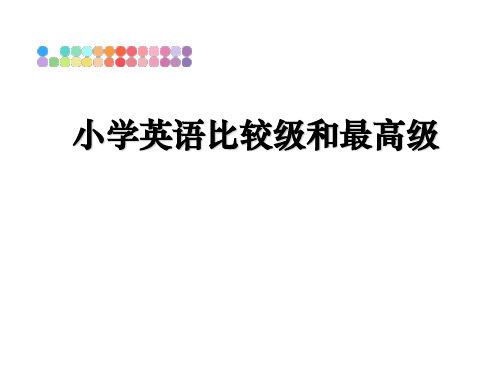
• 可死于呼吸循环衰竭、脑水肿或高热 (病程平均12h)
• 脑电图:节律性棘慢波发放 发作时难以检查EEG
强直性癫痫持续状态 (tonic status epilepticus)
• 早发(< 5 y) • 症状性或隐源性 • 伴智力发育落后 • 突然减异常 创伤
Time-related Systemic Complications of SE
SE与缺氧缺血性脑损伤
• 代谢活跃的脑组织易发生HIBD 海马神经元, 大脑皮质, 蒲金野细胞, 丘脑, 纹状体
6.My eyes are ________(big) than her • 7.Which is ___________(heavy), the elephant or the
pig? • 8.Who gets up _________(early), Tim or Tom?
基本概念
癫痫:异常放电→反复发作 (发作性,反复性)
癫痫发作(epileptic seizure):癫痫的临床表现 惊厥(convulsion):抽风,以肌肉抽搐为主的临 床症候
很多类型的癫痫发作并无惊厥表现 如失神发 作、精神症状发作
惊厥也并非都是癫痫发作(如破伤风的角弓 反张、低钙惊厥)
主要特点
临床表现
• 罕见 • 见于Lennox-Gastaut综合征,或各种
急性症状性癫痫。
• 长时间内(数小时至数日)频繁的全身 强直发作,流涎和青紫较明显
• 多有脑损伤和智能缺陷 • 脑电图为10~20HZ的棘波节律发放或
小学英语语法详解形容词--形容词的原级,比较级和最高级的用法
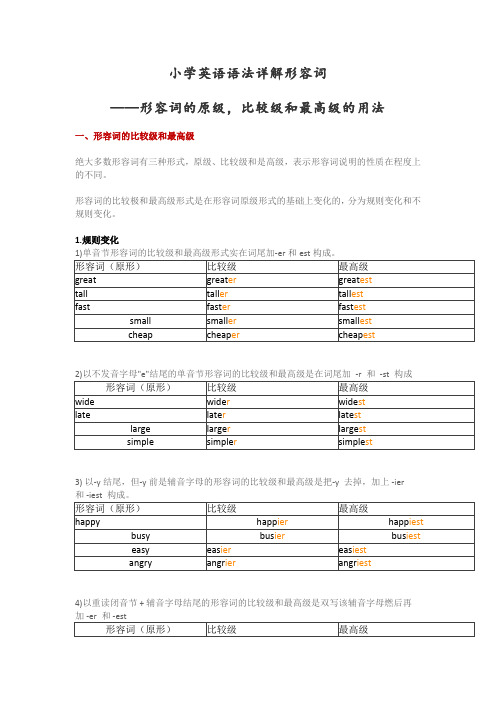
小学英语语法详解形容词——形容词的原级,比较级和最高级的用法一、形容词的比较级和最高级绝大多数形容词有三种形式,原级、比较级和是高级,表示形容词说明的性质在程度上的不同。
形容词的比较极和最高级形式是在形容词原级形式的基础上变化的,分为规则变化和不规则变化。
1.规则变化3) 以-y结尾,但-y前是辅音字母的形容词的比较级和最高级是把-y 去掉,加上 -ier4)以重读闭音节 + 辅音字母结尾的形容词的比较级和最高级是双写该辅音字母燃后再5)双音节和多音节形容词的比较级和最高级需用more和the most 加在形容词前面来Aaron老师的小提醒:★有些形容词的比较级和最高级,可以有两种表示法:clever—cleverer, cleverest 或者more clever, the most cleverfriendly—friendlier,friendliest 或者more friendly , the most friendly★形容词前如加less和least 则表示"较不"和"最不":important 重要,less important 较不重要,least important 最不重要。
二、形容词的原级,比较级和最高级的用法1.形容词的原级1)形容词的原级一般用在同级比较的情况较多,两个比较对象程度相同的,用“as + 形容词原级+as 的结构”Tom is as tall as his brothe.汤姆和他的哥哥一样高。
My hair is as long as hers.我的头发和她的一样长。
His shoes are as new as mine.他的鞋子和我的一样新。
在这两种结构中,第一个as是副词,而第二个as 是连词,一般后面接名词、代词或所有格。
2)如果表示“……不如……”则用“not so / as +形容词原级+as的结构”His bedroom is not as big as his sister's.他的房间不如他姐姐的大。
小学英语形容词比较级最高级重点讲解及练习
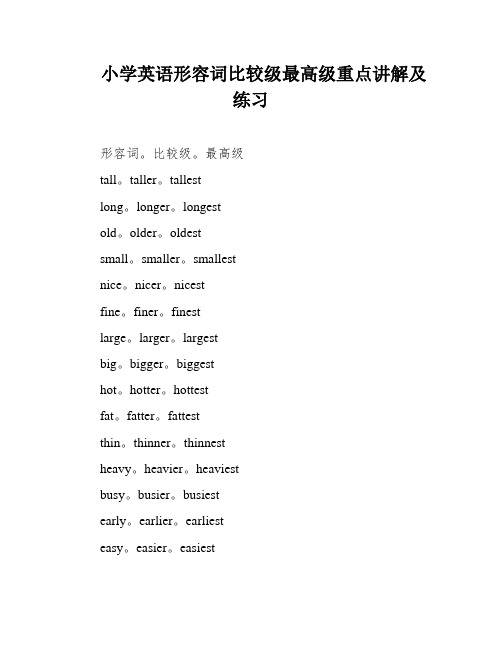
小学英语形容词比较级最高级重点讲解及练习形容词。
比较级。
最高级tall。
taller。
tallestlong。
longer。
longestold。
older。
oldestsmall。
smaller。
smallestnice。
nicer。
nicestfine。
finer。
finestlarge。
larger。
largestbig。
bigger。
biggesthot。
hotter。
hottestfat。
fatter。
fattestthin。
thinner。
thinnestheavy。
heavier。
heaviestbusy。
busier。
busiestearly。
earlier。
earliesteasy。
easier。
easiest单音以字母e结尾的形容词或副词,直接加-r,-st。
少数双音节以重读闭音节结尾的形容词或副词,如末尾只有一个辅音单字母,双写该字母,再加-er,-est。
以“辅音字母+y”结尾的形容词或副词,把y变为i,再加-er,-est。
部分双音节与多音节的词比较级在原级之前加more,最高级在原级之前加most,例如:beautiful---more beautiful---most beautifulinteresting---more interesting---most interestingdifficult---more difficult---most difficult不规则变化的形容词:little/few(原形)-less(比较级)-least(最高级)good(原形)-better(比较级)-best(最高级)bad(原形)- worse(比较级)- worst(最高级)far(原形)-- further—furthest例句:Tom is tall。
but John is taller。
Bob is the tallest of the three.I'm as tall as you.Tom is as tall as John.Bob is taller than John.John is the tallest in his class.1.Nice: The weather is nice today。
小学英语常用形容词比较级和最高级一览表(表格形式)
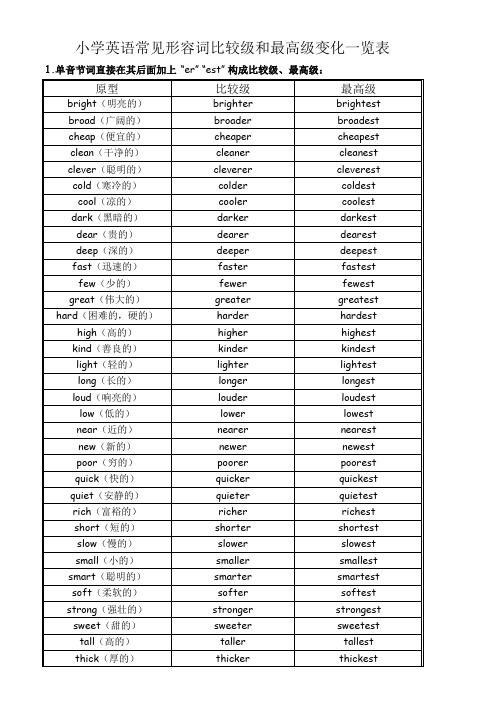
fast(迅速的)
faster
fastest
few(少的)
fewer
fewest
great(伟大的)
greater
greatest
hard(困难的,硬的)
harder
hardest
high(高的)
higher
highest
kind(善良的)
kinder
kindest
light(轻的)
lighter
lightest
silly(傻的) spicy(辣的) thirsty(渴的) ugly(丑的) 5.双音节、多音节形容词, 在单词前面加上 “more” “
原型
afraid(害怕的) beautiful(美丽的) careful(仔细的) cheerful(开心的) crowded(拥挤的) dangerous(危险的) delicious(美味的) difficult(困难的) exciting(令人兴奋的) expensive(昂贵的) famous(著名的) frightened(受惊的) frightening(令人害怕的) hard-working(勤奋的) helpful(有帮助的)
close(接近的) cute(可爱的) fine(好的,完美的) large(巨大的)
late(迟的)
closer cuter finer larger later
closest cutest finest largest latest
nice(好的) ripe(成熟的) rude(粗鲁的) safe(安全的) strange(奇怪的)
quieter
quietest
rich(富裕的)
richer
小学英语语法知识点学习:形容词比较级和最高级的用法

小学英语语法知识点学习:形容词比较级和最高级的用法上一次我们讲了形容词原级的用法,今天就来说说比较级和最高级吧~形容词比较级的用法【一】在"...than..."句中:He is taller than I.〔口语中常作:He is taller than me.〕他比我高。
He is two heads taller than I.他比我高出两个头。
【二】在"which..., ...or...?"句中,表示两者比较:Which is bigger, the sun or the moon?太阳和月亮,哪一个更大?【三】比较级+and+比较级:It's getting darker and darker.天越来越黑了。
He is getting more and more interested in sports.他对体育越来越感兴趣。
【四】The more..., the more...:The more you eat, the more you want.你越吃越想要。
【五】形容词比较级前可受much, far, a lot, still, no, a little, ev en, any 修饰,表示超出的程度:We have a much better life now.我们现在的日子好得多了。
The buildings look far uglier in London than here.伦敦的建筑比这儿的难看得多。
This story is even more interesting than that one.这个故事比那个更有趣。
I made a lot more mistakes than you (did).我犯的错误比你多多了。
Your cake is a little larger than mine.你的蛋糕比我的大一点儿。
- 1、下载文档前请自行甄别文档内容的完整性,平台不提供额外的编辑、内容补充、找答案等附加服务。
- 2、"仅部分预览"的文档,不可在线预览部分如存在完整性等问题,可反馈申请退款(可完整预览的文档不适用该条件!)。
- 3、如文档侵犯您的权益,请联系客服反馈,我们会尽快为您处理(人工客服工作时间:9:00-18:30)。
形容词的比较级和最高级
1. 在英语中,在表示“比较…”和“最…”时,形容词要用特别的形式,称为“比较
级”和“最高级”,原来的形容词称为“原级”:
a. 单音节词和少数双音节词以加-er和-est的方式构成:
原级比较级最高级
young年轻 younger较年轻 youngest最年轻
old老 older较老 oldest最老
clean干净 cleaner较干净 cleanest最干净
2. 形容词的比较级和最高级的构成方法如下
b. 其他词都在前面加more, most构成比较级及最高级:
原级比较级最高级
important more important most important
difficult more difficult most difficult
interesting more interesting most interesting
useful more useful most useful
3. 用比较级时常用than引起一个从句,表示和什么比较:
His room is bigger than mine. 他的房间比我的房间大。
She is younger than my sister. 她比我妹妹年轻。
形容词、副词的比较级和最高级
A 双音节或多音节副词构成比较级时之前加more,构成最高级时则加most:
单音节副词以及副词early则在词尾加er与est:
hard harder hardest
early earlier earliest(注意y变为i)
B 不规则变化:
well better best
badly worse worst
little less least
much more most
far farther farthest(仅用于指距离)
further furthest
.much,more,most
A more和most的用法相当自由:
You should ride more.
你必须多骑马。
I use this room most.
这个房间我用得最多。
但当much是原级时,使用范围较小。
B much意为a lot(许多)时可修饰表示否定意思的动词:
He doesn’t ride much nowadays.
现在他不太骑马了。
在表示疑问的句子里much主要与how连用。
在没有how的疑问句中可用much,但a lot更常见:
How much has he ridden?
他骑马多吗?
Has he ridden a lot/much?
他近来常骑马吗?
在肯定句中as/so/too+much是可以的。
在没有as/so/too的情况下,肯定句中用a lot/a good deal/a great deal会更好:
He shouts so much that…
他叫喊的太厉害了,以至于……
I talk too much.
我说得太多了。
但是说:
He rides a lot/a great deal.
他常骑马。
C very much意为greatly(非常)时,在肯定句中使用比较广泛。
常和它一起用的词有blame(责备),praise(赞扬),thank(感谢)及一些表达感情的动词:admire(钦佩),amuse(使娱悦),approve(赞成),dislike (不喜欢),distress(使烦恼),enjoy(喜爱),impress(使有深刻印象),like(喜欢),object(反对),shock(震惊),surprise(使惊奇)等等:Thank you very much.
非常感谢你。
They admired him very much.
他们很钦佩他。
She objects very much to the noise they make.
她非常反对他们弄出的噪音。
much(=greatly非常)可以和very连用,也可以省去very而与下列分词连用:admired(受钦佩的),amused(娱悦的),dis-liked(不受喜欢的),distressed (烦恼的), impressed(留有……印象的),liked(受喜欢的),shocked (被震惊的),struck(受巨大影响的),upset(心烦意乱的)。
He was(very) much admired.
他很受人钦佩。
She was (very) much impressed by their good manners.
他们彬彬有礼,给她留下了深深的影响。
D much意为a lot(许多)时能够修饰形容词的比较级和最高级及动词:
much better好多了
much the best最最好
much more quickly快多了
much too可与形容词的原级连用:
He spoke much too fast.
他说话说得太快了。
E most放在形容词或副词之前,有“很”的意思。
主要与双音节或多音节形容词/副词连用:
He was most apologetic.
他已表示十分的歉意了。
She behaved most generously.
她的行为非常慷慨大度。
6.使用各比较等级的句子结构
两个分句中都要求使用同一动词时,我们通常用助动词来表示第二个动词。
A as+原级+as用于肯定句,as/so+原级+as用于否定句:
He worked as slowly as he dared.
他干活敢多么磨蹭就多么磨蹭。
He doesn’t snore as/so loudly as you do.
他打鼾的声音没有你响。
It didn’t take as/so long as I e xpected.
花的时间比我预料的短。
B than与比较级连用:
He eats more quickly than I do/than me.
他比我吃得快。
He played better than he had ever played.
过去任何时候都演奏得好。
They arrived earlier than I expected.
他们比我预料的到得早。
the+比较级…the+比较级结构中也用副词:
The earlier you start the sooner you’ll be back.
你出发得越早,回来得就越早。
C 最高级可与of+名词连用:
He went(the)furthest of the explorers.
在所有探险者中他走得最远。
但这种结构不常用。
这类句子应当用比较级来表达,如上文所述。
副词的最高级(不加the)+of all这种结构很常用,但all常指同一主语的其他动作:
He likes swimming best of all.
他最喜欢游泳。
(他喜欢游泳胜过其他一切运动。
)
I. 学会下列形容词的比较级和最高级:
原级比较级最高级
1. tall taller tallest
strong stronger strongest
old older oldest
2. large larger largest
fine finer finest
late later latest
3. big bigger biggest
hot hotter hottest
thin thinner thinnest
4. easy easier easiest
busy busier busiest
happy happier happiest
5. valuable more valuable most valuable
dangerous more dangerous most dangerous
comfortable more comfortable most comfortable
II. 给出下面形容词的比较级和最高级:
1. bright
2. wide
3. fat
4. high
5. lazy
6. heavy
7. sad 8. brave
9. silly 10. beautiful
11. early 12. close
13. interesting 14. dirty
15. difficult 16. delicious。
